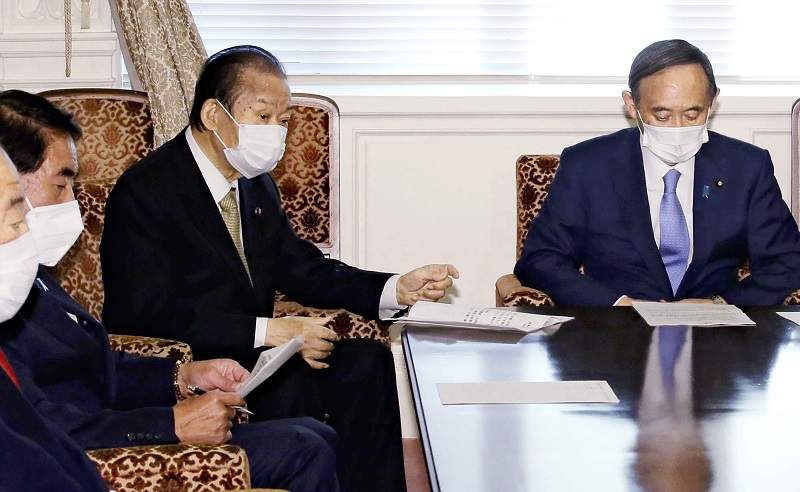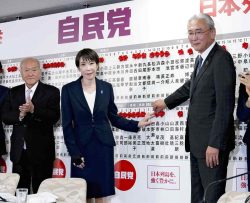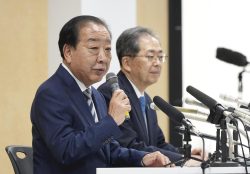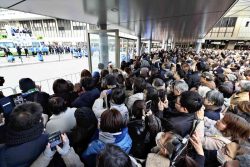
Prime Minister Yoshihide Suga, right, and Liberal Democratic Party Secretary General Toshihiro Nikai, are seen at the LDP party executives’ meeting in April.
18:22 JST, June 8, 2021
With less than one month to go until the Tokyo Metropolitan Assembly election on July 4, political parties have been gearing up for their campaigns with the view that this poll is a barometer to gauge the next House of Representatives election.
The Liberal Democratic Party, which suffered a crushing defeat in the previous Tokyo assembly election four years ago, has been struggling to solidify its organizational support while being wary of a backlash against the party.
On Thursday, LDP Secretary General Toshihiro Nikai called LDP Diet members elected from Tokyo constituencies one after another into his office to give them a pep talk. Nikai handed over a document showing the voting data in the previous election to the lawmakers, including Katsuei Hirasawa, the minister for reconstruction. Nikai said: “If things go like this again, we’ll go nowhere. Make every possible effort, because the Tokyo assembly election is the lead-up to the lower house election.”
In the previous Tokyo assembly election, the LDP was overwhelmed by the regional political party Tomin First no Kai, which was led by Tokyo Gov. Yuriko Koike, and won only 23 seats.
Tomin First won 49 seats, obtaining a position as the largest party in the 127-seat assembly.
This time, however, Tomin First does not seem to have the momentum seen in the previous election. According to a Yomiuri Shimbun survey in late May that asked which party the respondents will vote for in the next Tokyo assembly election, the LDP ranked No. 1 at 30%, with Tomin First at only 11%.
The LDP has relied on organizational votes, such as those from industry organizations. The LDP’s House of Councillors caucus is making full use of its lawmakers elected under the proportional representation system who have a strong connection with industry organizations.
The LDP’s Party Organization and Campaign Headquarters is repeatedly holding meetings to hear requests from industry organizations. A senior LDP member said, “If we can solidify our support base, we’ll be able to seek a large gain in the seats.”
Another favorable factor for the LDP is the return of Komeito, which cooperated with Tomin First in the previous election. Komeito restored its cooperative relationship with the LDP in Tokyo this time.
However, the activities of Soka Gakkai, Komeito’s main support base, have been largely restricted by the novel coronavirus crisis. A senior Komeito member said, “There is a limit to our efforts to call for support by using telephones alone.”
There is also concern about how voters evaluate the government’s response to the coronavirus crisis, and a series of “money and politics” scandals involving LDP lawmakers.
Depending on Koike’s actions, the situation surrounding the Tokyo assembly election could change greatly. The LDP has been strengthening pressure on Koike through Nikai, who has maintained amicable relations with Koike, to not support Tomin First. On the other hand, Tomin First is pinning high hopes on Koike, who is the special adviser to the party, to launch her support for the party.
CDPJ to field only 28
The Constitutional Democratic Party of Japan was to field only 28 candidates as of Thursday. The CDPJ central leadership expects to increase the number of candidates, while the party’s Tokyo chapter has remained negative about that.
Taking into account the falling approval rating of Prime Minister Yoshihide Suga’s Cabinet, the CDPJ leadership believes there is room for winning more seats.
At a press conference, CDPJ Secretary General Tetsuro Fukuyama said, “I asked Tokyo chapter executives to make efforts to field new candidates.” CDPJ Diet Affairs Committee chairman Jun Azumi is also said to be active in fielding new candidates.
In the 2013 Tokyo assembly election, the party’s predecessor, the Democratic Party of Japan, fielded two candidates each in six constituencies. However, the candidates ultimately canceled each other out and neither of them won in five of the six constituencies.
“Our party intentionally narrowed down candidates with the aim of winning all of them,” said a senior member of the Tokyo chapter.
It is also a source of concern that labor unions, the major supporters of the party, are unsatisfied with the party’s approach to the Japanese Communist Party. Rengo Tokyo, the capital’s chapter of the Japanese Trade Union Confederation (Rengo), is increasingly frustrated with the CDPJ’s fielding candidates in cooperation with the JCP. Rengo Tokyo released a comment last Tuesday, stating that they cannot ignore the unbridgeable rift with the CDPJ’s Tokyo chapter.
Top Articles in Politics
-

Japan PM Takaichi’s Cabinet Resigns en Masse
-

Sanae Takaichi Elected 105th Prime Minister of Japan; Keeps All Cabinet Appointees from Previous Term
-

Japan’s Govt to Submit Road Map for Growth Strategy in March, PM Takaichi to Announce in Upcoming Policy Speech
-

LDP Wins Historic Landslide Victory
-

LDP Wins Landslide Victory, Secures Single-party Majority; Ruling Coalition with JIP Poised to Secure Over 300 seats (UPDATE 1)
JN ACCESS RANKING
-

Japan PM Takaichi’s Cabinet Resigns en Masse
-

Japan Institute to Use Domestic Commercial Optical Lattice Clock to Set Japan Standard Time
-

Israeli Ambassador to Japan Speaks about Japan’s Role in the Reconstruction of Gaza
-

Man Infected with Measles Reportedly Dined at Restaurant in Tokyo Station
-

Man Infected with Measles May Have Come in Contact with Many People in Tokyo, Went to Store, Restaurant Around When Symptoms Emerged




















